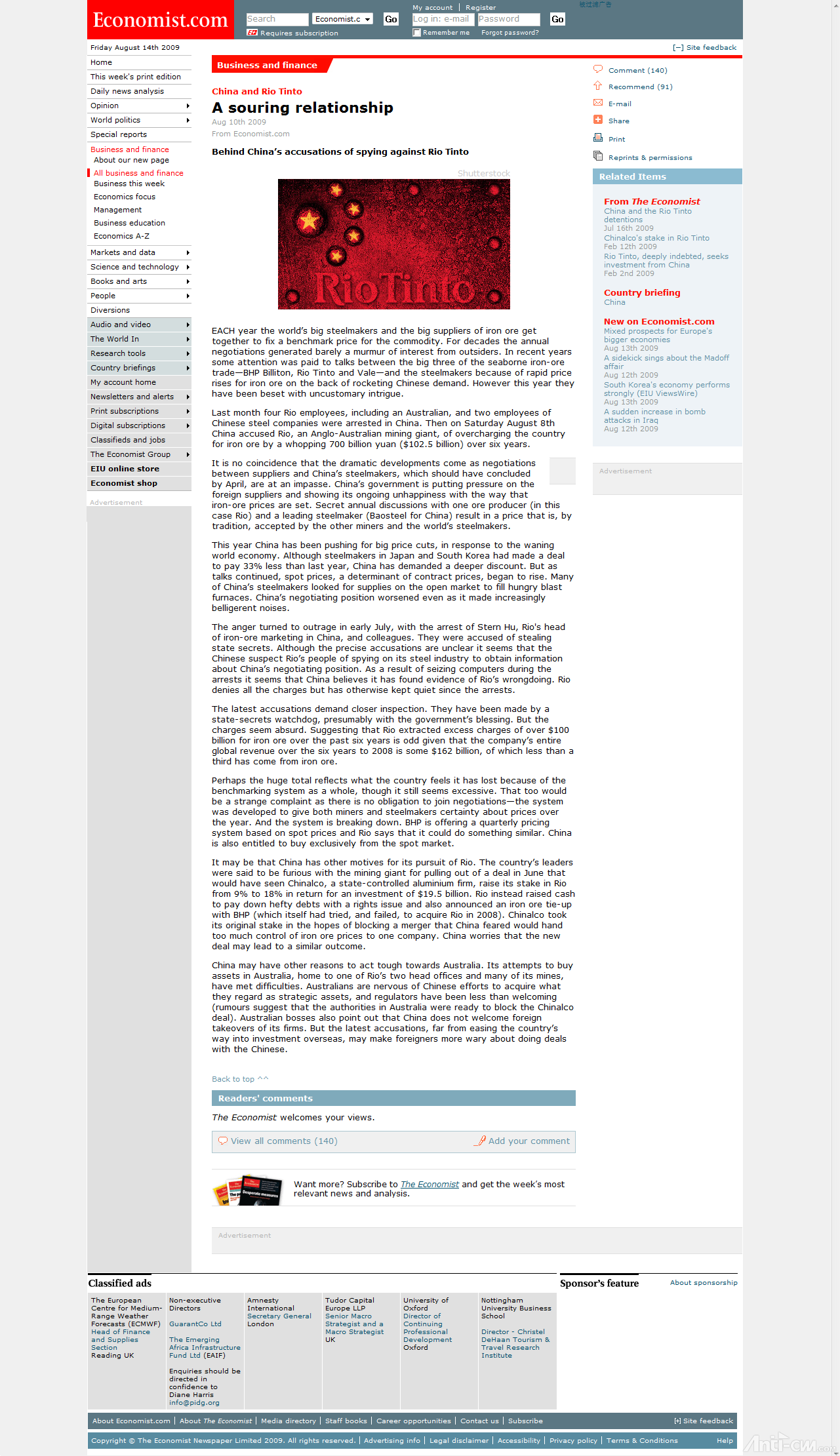|
|
本帖最后由 vivicat 于 2009-8-14 15:20 编辑
China and Rio Tinto
A souring relationship
Aug 10th 2009
From Economist.com
http://www.economist.com/businessfinance/displaystory.cfm?story_id=14205057
Behind China’s accusations of spying against Rio Tinto

EACH year the world’s big steelmakers and the big suppliers of iron ore get together to fix a benchmark price for the commodity. For decades the annual negotiations generated barely a murmur of interest from outsiders. In recent years some attention was paid to talks between the big three of the seaborne iron-ore trade—BHP Billiton, Rio Tinto and Vale—and the steelmakers because of rapid price rises for iron ore on the back of rocketing Chinese demand. However this year they have been beset with uncustomary intrigue.
Last month four Rio employees, including an Australian, and two employees of Chinese steel companies were arrested in China. Then on Saturday August 8th China accused Rio, an Anglo-Australian mining giant, of overcharging the country for iron ore by a whopping 700 billion yuan ($102.5 billion) over six years.
It is no coincidence that the dramatic developments come as negotiations between suppliers and China’s steelmakers, which should have concluded by April, are at an impasse. China’s government is putting pressure on the foreign suppliers and showing its ongoing unhappiness with the way that iron-ore prices are set. Secret annual discussions with one ore producer (in this case Rio) and a leading steelmaker (Baosteel for China) result in a price that is, by tradition, accepted by the other miners and the world’s steelmakers.
This year China has been pushing for big price cuts, in response to the waning world economy. Although steelmakers in Japan and South Korea had made a deal to pay 33% less than last year, China has demanded a deeper discount. But as talks continued, spot prices, a determinant of contract prices, began to rise. Many of China’s steelmakers looked for supplies on the open market to fill hungry blast furnaces. China’s negotiating position worsened even as it made increasingly belligerent noises.
The anger turned to outrage in early July, with the arrest of Stern Hu, Rio's head of iron-ore marketing in China, and colleagues. They were accused of stealing state secrets. Although the precise accusations are unclear it seems that the Chinese suspect Rio’s people of spying on its steel industry to obtain information about China’s negotiating position. As a result of seizing computers during the arrests it seems that China believes it has found evidence of Rio’s wrongdoing. Rio denies all the charges but has otherwise kept quiet since the arrests.
The latest accusations demand closer inspection. They have been made by a state-secrets watchdog, presumably with the government’s blessing. But the charges seem absurd. Suggesting that Rio extracted excess charges of over $100 billion for iron ore over the past six years is odd given that the company’s entire global revenue over the six years to 2008 is some $162 billion, of which less than a third has come from iron ore.
Perhaps the huge total reflects what the country feels it has lost because of the benchmarking system as a whole, though it still seems excessive. That too would be a strange complaint as there is no obligation to join negotiations—the system was developed to give both miners and steelmakers certainty about prices over the year. And the system is breaking down. BHP is offering a quarterly pricing system based on spot prices and Rio says that it could do something similar. China is also entitled to buy exclusively from the spot market.
It may be that China has other motives for its pursuit of Rio. The country’s leaders were said to be furious with the mining giant for pulling out of a deal in June that would have seen Chinalco, a state-controlled aluminium firm, raise its stake in Rio from 9% to 18% in return for an investment of $19.5 billion. Rio instead raised cash to pay down hefty debts with a rights issue and also announced an iron ore tie-up with BHP (which itself had tried, and failed, to acquire Rio in 2008). Chinalco took its original stake in the hopes of blocking a merger that China feared would hand too much control of iron ore prices to one company. China worries that the new deal may lead to a similar outcome.
China may have other reasons to act tough towards Australia. Its attempts to buy assets in Australia, home to one of Rio’s two head offices and many of its mines, have met difficulties. Australians are nervous of Chinese efforts to acquire what they regard as strategic assets, and regulators have been less than welcoming (rumours suggest that the authorities in Australia were ready to block the Chinalco deal). Australian bosses also point out that China does not welcome foreign takeovers of its firms. But the latest accusations, far from easing the country’s way into investment overseas, may make foreigners more wary about doing deals with the Chinese.

|
China, eco, relationship, Rio, souring, China, eco, relationship, Rio, souring, China, eco, relationship, Rio, souring
|